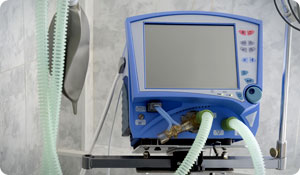
Doctors rely on periodic pulmonary function tests to monitor asthma. This is because the severity of asthma varies over time. Keeping up with these changes is important to make any necessary modifications to your treatments.
Spirometry
The National Heart, Lung, and Blood Institute (NHLBI) recommends that once a person is diagnosed and her asthma is stabilized, doctors should perform a spirometry test every year or two (or more often if the situation warrants).
Spirometry measures the amount of air you're able to move in and out of your lungs when you inhale and exhale, as well as the speed at which you're able to propel the air from your lungs. You'll be asked to breathe in and out of a tube that's attached to the spirometry machine. Usually a baseline reading is performed, and you'll be asked to use a bronchodilator (inhaler) and repeat the test again to see if this treatment opens up your airways. To ensure the most accurate results, he test is usually repeated at least three times both before and after using the inhaler..
Lung Volume Measurement
Another common breathing test used for asthma is lung volume measurement. It looks at how much air your lungs can hold and how much air remains in them after you exhale forcefully. Several different methods can be used to gather this information. One of the most common options is using a "body box," (also called plethysmography) which requires you to sit in a clear enclosed chamber and pant into a tube in order to measure chest volume, expansion, and compression.
Lung Diffusion Capacity
Lung diffusion capacity tests measure how well your lungs release oxygen into your blood. The most common approach requires that you inhale a special mixture (commonly containing a small amount of carbon monoxide and helium), and hold your breath for 10 seconds before exhaling. The composition of the gas mixture exhaled can provide your doctor with important information about how well your lungs can transfer air into your blood.
Interpreting Your Pulmonary Function Tests
Most pulmonary function tests can be performed right in your doctor's office or in a special pulmonary clinic. The findings will be used in conjunction with your medical history and physical exam to determine how your lungs are working. Your results will be compared to that of other people of similar age, height, weight, gender, and ethnic background to see where you fall within the expected norms. Your results will also be compared to past results to see if any changes have occurred. If your asthma has worsened, it can be indicative that your asthma isn't well controlled, or that something else is occurring. This can also mean that your medication may need to be adjusted accordingly or your doctor may need to perform further testing to rule out any other lung problems.
Sources:
Asthma Initiative of Michigan
http://www.getasthmahelp.org/PFT.asp
National Heart, Blood and Lung Institute (NHBLI)
http://www.nhlbi.nih.gov/health/dci/Diseases/lft/lft_whatare.html
http://www.nhlbi.nih.gov/health/dci/Diseases/lft/lft_types.html
http://www.nhlbi.nih.gov/health/dci/Diseases/lft/lft_show.html
http://www.nhlbi.nih.gov/health/prof/lung/asthma/asthmacare.pdf
National Jewish Health
http://www.nationaljewish.org/programs/tests/pulmonary-physiology/pulmonary-function/spirometry.aspx
National Library of Medicine NLM/Medline Plus Medical Encyclopedia





